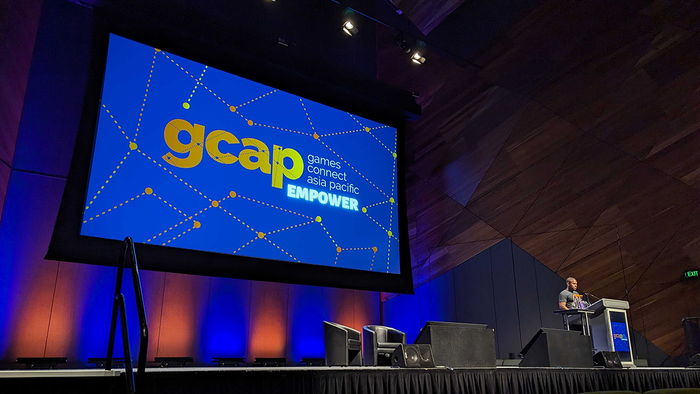
Featured Blog | This community-written post highlights the best of what the game industry has to offer. Read more like it on the Game Developer Blogs.
Together, we built a successful digital board games business. Here are 5 crucial lessons we learned.
How we built a digital board game studio, the lessons we’ve learned, and how we’ve managed to sustain a successful mobile game development and publishing business without feeling the need to succumb to the dark arts of free to play mechanics & consuma

We are Mike Willis and Cristina Mereuta. Mike is the CEO of Marmalade Game Studio and, alongside COO Cristina, we’re the company’s creative leads. We’re about to launch our new Monopoly game for iOS and Android on the 4th of December.
Today, however, we want to talk about how we got to this point, the lessons we’ve learned, and how we’ve managed to sustain a successful mobile game development and publishing business without feeling the need to learn the dark arts of free to play mechanics and consumables.
The two of us joined Marmalade to help operate what was at the time a work-for-hire development studio. Now, Marmalade is a successful developer and publisher of our own games - digital board games that we’re extremely proud of.
We’ve learned several important lessons along the way; lessons which we’re pleased to be able to share today:
1. Find the fun
Prior to working at Marmalade, both of us worked at EA on separate AAA franchises, Cristina on FIFA and Mike on Harry Potter.
Truthfully, neither of us were intimately familiar with either franchise, but we were determined that it would not hinder us from producing the best possible iteration of either game in the series. Quite quickly we discovered, independently of one another, that our own personal experiences shouldn’t and wouldn’t be a blocker, because the crucial element always centred around putting gameplay first. We found that if we could find the fun, that seemingly inscrutable witchcraft which made these titles so exciting to play for the millions of people who did play them, we could develop something that any gamer would enjoy, then layer the key elements of the franchise on top.
2. Know your niche
When we joined Marmalade, we took this guiding principle along with us. At the time, Marmalade had been operating as a work-for-hire studio, producing mobile games for well-known and high-profile clients. Because of our approach, we were turning out finished titles that stood leagues above the usual mobile tie-in games that live on the app stores. But of course, these weren’t our titles - we had produced them for someone else.
In 2016, the Marmalade board of directors decided that they wanted to back both of us to pivot the studio from its current work-for-hire direction to a publisher/developer outfit; we would finally have ownership over and a stake in the games we produced.
We decided that to succeed as a publisher of mobile games, we would need to identify a specific area where we could put our principles to good use and provide experiences that no-one else was currently offering.
Marmalade has always been a team for whom social games fit neatly into our culture. When we weren’t developing, we always used our downtime to sit down together and enjoy board games. Very quickly, then, we identified that as a key area of interest. It was during this research phase that we noticed that, while there were digital board games on the market, the people developing them simply weren’t displaying the kind of passion and drive to innovate that we were becoming known for. With that in mind, our path forward seemed clear.

3. Quality is everything
There is no point making games which disappoint people. They're not good for business, not good for reputation and also not fun to work on. People play games in order to have fun and to feel entertained. Bugs, glitches and bad UX all distract from that experience and they end up undermining the efforts you made in other aspects of the game.
We are perfectionists, so we strive to do our best with everything. We ended up pushing for high quality with all our games out of instinct, because we couldn’t help it. But all the feedback we got in the last 3 years is telling us that this is the right thing to do. Anyone can make “good enough” games, but the 5* reviews and the user loyalty are reserved for those who go the extra mile and do more than the minimum necessary.
4. Everyone’s not replaceable
Take a typical development team and you will be able to map everyone onto a tidy bell curve of skill/talent/performance. Most people will do a good job, some will slack off and a few will be the true geniuses that make the game everyone is working on truly stand out. The bigger the team, the more obvious this distribution becomes. When we took over Marmalade, the company was facing all the struggles of an early-stage startup while fighting the decline that buried its SDK arm. We knew that if we had any chance to turn it around, our vision and strategy weren’t going to be enough. We had to build a team comprising exclusively of superstars that normally make the top 5% of the bell curves in the industry.
It was very hard to begin with because we didn’t have much to offer to these people, other than a grand ambition to make great things. We are immensely grateful to what we call “our initial team”, who believed in us and joined us on this crazy journey in the early days. As we started releasing successful games, growing, dominating the board games charts, etc., it got easier. Three years later, we now get plenty of applicants for each role we open and we reliably attract the special ones that we want to work with.
Our focus has become keeping them happy and preserving the traits that made us hire them in the first place. It goes without saying that respect is a two-way street and people will give you their best if you do the same for them. That applies to everything from salaries and perks all the way to ensuring a good environment. In this respect, our two defining attributes are a zero-tolerance policy to bullying and inappropriate behaviour and a complete rejection of micromanagement as a strategy. We believe good management is crucial to any company, but micromanagement is something completely different. Both our studios have a very flat structure and, apart from a few key people responsible for large areas of the business, we do not believe in rigid hierarchies. Everyone is responsible for themselves and their own work and this inspires people to be their best selves and do their best with everything. We found that treating people like adults tends to make them behave like adults.
5. Pre-production is about failing (early)
Every Marmalade game follows a pretty standard life cycle, from pre-production to publishing and post-launch support and marketing. However, for the last three years, the phase that we have evolved the most is the pre-production phase and now we see it as one of the main things that drive our very efficient development cycles and high quality.
We had a good understanding of what we were trying to achieve in this early phase and we used to believe that it was ok to leave pre-production with things to figure out in the future, like how particular features would work together or how we would communicate various things to the users . We saw value in getting on with things without worrying too much about details. The trouble was this still meant we could fail late, which tends to be unpredictable and expensive. We had to iterate this throughout the years in order to learn to fail earlier.
We can’t stress how important this is and how much this change of paradigm has improved our processes and efficiency. We now embrace the unknowns as about the only thing we need to care about in pre-production. The entire feature set has to be thrown up in the air and every idea tested before we can be sure it isn’t the thing that will fail later. And if you haven’t failed yet, you aren’t trying hard enough. The lost feeling that comes with the unpredictable nature of this process is not scary if it’s constrained and timeboxed so it doesn’t get out of control. Once this chaos is over, we are happy to go into production with a full understanding of the game we are making. Production becomes all about execution and the entire team is confident and motivated.

Finally, some advice:
As will always be the case, some of the lessons we’ve learned above will resonate with other games companies and some won’t. But if we had to offer a single piece of advice, this is one that should ring true for everyone: always remember what games are about!
Our entire industry exists because human beings have an innate need for fun and entertainment. The games we make must satisfy that need, otherwise there is no point making them. Every single feature, every detail, every choice you make about something in your game needs to be made keeping the fun in mind. This is one of the reasons we feel so at home with a premium business model, where we don’t have to design for that subtle frustration that drives users to buy IAPs in free to play. We can just focus on making the game as fun as it can possibly be, giving users the best possible experience and doing our part in making the world a happier place.
Our officially-licensed Monopoly game launches on iOS and Android on Wednesday 4th December.
Read more about:
Featured BlogsAbout the Author(s)
You May Also Like







